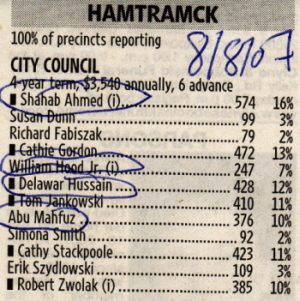Islam Online Biography
Source:- Google.com.pkShaykh al-Islaam Ibn Taymiyyah
*Please appropriately reference this biography to: www.fatwa-online.com, thankyou!*
All praise is for Allaah Lord of the worlds. Peace and blessings be upon Muhammad (sal-Allaahu `alayhe wa sallam), his pure family, his companions and all those who strive to follow in their footsteps till the last day. To preceed :
Many people today accuse some of the greatest scholars of Islaam of blasphemy and kufr (disbelief). One who is frequently attacked is Shaykh al-Islaam Ibn Taymiyyah - rahima-hullaah -. In actual fact he is slandered and lied against. People say things about him which he never said... in actual fact things which he was totally against!! These people who do should fear Allaah, and remember that they should be just and judge a man with justice and from knowledge, rather than judging him from ignorance and heresay ! subhaan-Allaah, Ibn Taymiyyah used to strive for the upliftment of the sunnah, and for the defence of this deen from those who in ignorance are changing it. And it was he who led the people to fight the tyrant tartars and it was he who suffered the darkness of the jails of Egypt so that Islaam can be lifted, and it was he who used to pray to Allaah to guide those who are misguided. Therefore let there be a warning to those who blemish his name - a severe warning indeed- that they may not slander him, for a scholar's flesh is poisonous.
Many people accuse Ibn Taymiyyah of Likening Allaah to the creation.....this a big lie and slander...and these people should fear Allaah, and take account of the evil their tongues utter before its too late. Inshaa.-Allaah below are some quotes from the writings of the noble Shaykh which clarifies his position beyond doubt on this issue. And those who after reading this still utter salnder and lies agianst the Shaykh, then all that can be said about them is that they have an illness in their hearts, and we pray to Allaah that He cures them of this disease.
In "al-'Aqeedatul Waasitiyaah " Ibn Taymiyyah - rahima-hullaah - says:
"from faith (eemaan) is acceptance (eemaan) of what Allaah has ascribed Himself in the scripture as well as what the messenger r ascribed to Him. [This creed] prevents any attempts at altering the sacred texts (tahreef), and rules out stripping Allaah of his tributes (ta'teel) or asking questions), concerining their modality ( takyeef..ie ..ascribing a "howness", or attempting to understand them analogicaly (tamtheel). Indeed [the ahlus-sunnah] hold that:
There is nothing like unto Him (Allaah); [that] He is the All-Hearing and All-Seeing One (Qur.aan 42:11).
They do not negate what Allaah has attributed Himself, nor do they alter the meaning of His words on these matters, nor subscribe to heretical notions regarding the divine names (asmaa') and manifestations (aayaat). They do NOT (!!!) seek to explain His attributes (sifaat) or COMPARE THEM with those of HIS CREATURES, for He (Allaah) has no namesake (samiy), no equal, no peer (nidd) and, therefore, He, the One free of all imperfections and Most High, does NOT befit of being compared to His creatures."
Ibn Taymiyyah says in at-Tadmuriyyah (p20):
"It is a must to affirm that which Allaah affirms for himself , whilst NEGATING ANY likeness to Him to His craetion..... whoever says His Knowledge is like my knowledge, His Power like my power, or Love like my love, or Pleasure like my pleasure, or Hand like my hand, or istawaa (ascending) like my ascending-- then he has resembled and likened Allaah to His creation. Rather, it is must to affirm (Allaah's Attributes) without any resemblance, and to negate (what Allaah negates for Himself), without ta'teel (divesting Allaah of any of His affirmed Attributes)."
Ibn Taymiyyah wrote in Majmoo-al Fatawaa (5/262):
"Whosoever considers the Attributes of Allaah to be like the attributes of creation- such that the Istawa (Ascending) of Allaah is like the ascending of the creation, or His nuzool (descending) is like the descending of the creation, or other than that-- then he is a DEVIATED INNOVATOR."
So people please read and pay heed to the words of the noble scholar !!!!
This is enough proof for those that are just and who are sincerely seeking the truth ...and Allaah knows best.
Taqi.ud-deen Abul-'Abbaas Ahmad Ibn 'Abdul-Haleem Ibn 'Abdus-Salaam Ibn Taymiyyah al-Harraanee al-Hanbalee, was born on Monday the 10th of Rabi' al-Awwal 66l A.H./22nd of January 1263 C.E. at Harraan (northern Iraq) into a well known family of "mutakallimoon"(theologians). His grandfather, Abu al-Barkat Majd-ud-deen ibn Taymiyyah (d.653 A.H./1255 C.E.) was a reputed teacher of the Hanbaleete school and his "Muntaqa al-Akhbaar (selections of prophetic sayings) which classifies such Ahaadeeth upon which Islaamic legislation is based, is even today regarded as a very valuable work. Likewise, the scholarly achievements of Ibn Taymiyyah's father, Shihaabuddeen 'Abdul-Haleem Ibn Taymiyyah (d.682 A.H./1284 C.E.) were wide spread.
This was the time when the Tataar hordes under Hulagu Khaan were inflicting their barbaric onslaught throughout the world of Islaam - especially the mesopotamium region. Ibn Taymiyyah was only seven when the Tataars launched their attack on Harraan. Consequently, the populace left Harraan to seek refuge elsewhere. Ibn Taymiyyah's family proceeded to Damascus in 667 A.H./1268 C.E. which was then ruled by the Mamlooks of Egypt. It was here that his father delivered sermons from the pulpit of the Umayyad Mosque and was invited to teach Hadeeth in the mosque as well as in the Daarul-Hadeeth 'Assaakuriyyah in Damascus. These discourses were attended by a large number of students as well as by the scholars. Damascus was the center of Islaamic studies at that time, and Ahmad Ibn Taymiyyah followed in the footsteps of his father who was a scholar of Islaamic studies by studying with the great scholars of his time, among them a woman scholar by the name Zaynab bint Makkee who taught him hadeeth.
Education
From his early childhood, Ibn Taymiyyah was an industrious student. He fully acquainted himself with all the secular and religious sciences of his time. He devoted special attention to Arabic literature and gained mastery over grammar and lexicography. Not only did he become an expert on the great Arab grammarian Seebawayh's al-Kitaab which is regarded as the greatest authority on grammar and syntax, but he also pointed out the errors therein. He commanded knowledge of all the prose and poetry then available. Furthermore, he studied the history of both pre Islaamic Arabia and that of the post-Islaamic period. Finally, he learnt mathematics and calligraphy.
As for the religions sciences, Ibn Taymiyyah studied the Qur.aan, Hadeeth and Sharee'ah. He learnt the Hanbalee fiqh (law) from his own father and then became a distinguished representative of the Hanbalee school of law. He is reported to have acquired his knowledge on Hadeeth in Syria like Ibn 'Abduddayaam. Another of his teachers was Shamsuddeen 'Abdurrahmaan al-Maqdisee (d.682 A.H./1283 C.E.).Thus Ibn Taymiyyah received a thorough grounding in the Sihaah Sittah and the Musnad of Imaam Ahmad.
Ibn Taymiyyah had great love for tafseer (Qur.aanic exegesis). He read over a hundred commentaries of the Qur.aan.
He completed his studies when he was a teenager and at age 19 he became a professor of Islaamic studies. Well versed in Qur.aanic studies, Hadeeth, fiqh, theology, Arabic grammar and scholastic theology, etc., he started giving fatwas on religious legal matters without following any of the traditional legal schools, the Hanafee, Maalikee, Shaafi'ee and Hanbalee. He defended the sound prophetic traditions by arguments which, although taken from the Qur.aan and the Sunnah, had hitherto been unfamiliar to people of his time. The freedom of his polemics made him many enemies among the scholars of the traditional Orthodox Schools, who falsely accused him, of all kinds of heretical beliefs. Among them was the famous Muslim medieval traveler, Ibn Batutah, who visited Damascus while Ibn Taymiyyah was in jail. This did not hinder Ibn Batutah in testifying in his book that "he witnessed Ibn Taymiyyah on the pulpit saying, 'every night Allaah descends to the lower heaven like my descent', and he descended one step down the pulpit". From reading this 'aqeedah we learn that Ibn Taymiyyah accepted the attributes of Allaah without questioning (bi-laa kayfa).
When Ibn Taymiyyah lost his father in 682 A.H./1283 C.E. at the age of twenty two, he succeeded at the 'Assaakuriyyah. He began to teach "Tafseer" at the Umayyad mosque and in 695 A.H./1296 C.E. he began to teach at the Hanbaleeyyah in Damascus. Soon he became prominent among the leading scholars of Syria and also became immensely popular with the masses.
The Mongol Threat
In the meanwhile, Iraq, Iran, and Khuraasaan continued to smother under the cruel domination of the Tataars. The Mamlooks who were ruling over Egypt, Syria and the Hijaaz (Arabian peninsula) attempted several times to capture Iraq but failed each time. When it was learnt that the Tataars were planning to conquer Damascus, the Mamlook Sultaan, al-Maalik an-Naasir Muhammad bin Qalawoon left Egypt with a powerful army to check the advance of the Tataars.
The two forces met in a bloody battle in 699 A.H./1299 C.E. but the Sultaan was defeated and he returned to Egypt. Now Damascus lay open before the Tataar forces led by Ghazzaan, also known as Mahmood, the great grandson of Ghengis Khaan. Consequently, all the nobles including the religions scholars, judges, administrators and traders fled from Damascus where total chaos and anarchy held sway in the face of the Tataar invasion.
At this critical moment Ibn Taymiyyah and their remaining notables decided to lead a delegation to meet Ghazzaan and pursue for peace of the city. Accordingly, the delegation led by Ibn Taymiyyah met Ghazzaan at Nabak (near Damascus) and he agreed to grant amnesty to the people of Damascus.
News of the Tataar army advancing towards Syria again reached Damascus in 702 A.H./1303 C.E. Delay in the arrival of Sultaan Qalawoon from Egypt caused panic among the people, many of whom began to abandon their homes for safer places. When Ibn Taymiyyah saw this, he began to urge the people to defend themselves and their city, thereby arresting the exodus. He also went personally to appeal to the Sultaan to speed up his journey to Damascus.
At last the Muslim forces of Egypt and Syria encountered the Tataar forces at Thaqab during Ramadhaan 702 A.H./1303 C.E. and after a bloody conflict the Muslims defeated and dispersed the Tataar armies.
Jihaad Against Heretics
Ibn Taymiyyah's fight was not limited to the Soofees and the people who followed the heretical innovations; in addition, he fought against the Tataars who attacked the Muslim world and almost reached Damascus. The people of Syria sent him to Egypt to urge the Mamlook Sultaan, the Sultaan of Egypt and Syria to lead his troops to Syria to save it from the invading Tataars. When he realized that the Sultaan was hesitant to do what he asked of him, he threatened the Sultaan by saying: "If you turn your back on Syria we will appoint a Sultaan over it who can defend it and enjoy it at the time of peace". He was present at the battle of Shaqhab near Damascus against the Tataars which took place during the fasting month of Ramadhaan and gave a fatwa to the army to break their fast in order to help them against their enemy, as the Prophet Muhammad (sal-Allaahu `alayhe wa sallam) did during the battle of the liberation of Makkah. The Muslims won the battle against the Tataars and drove them away from Damascus and all Syria. Ibn Taymiyyah's courage was expressed when he went with a delegation of 'ulamaa. to talk to Qazan the Khan of the Tataars to stop his attack on the Muslims. Not one of the 'ulamaa. dared to say anything to him except Ibn Taymiyyah who said: "You claim that you are Muslim and you have with you mu'adhdhins, judges, Imam and Shaykh but you invaded us and reached our country for what? While your father and your grandfather, Hulago, were non-believers, they did not attack the land of Islaam, rather, they promised not to attack and they kept their promise. But you promised and broke your promise."
Islam Online Biography Islam Facts For Kids Pictures About Religion Wikipedia And History And Beliefs Worksheet On Women Today And Information Images Wallpapers

Islam Online Biography Islam Facts For Kids Pictures About Religion Wikipedia And History And Beliefs Worksheet On Women Today And Information Images Wallpapers

Islam Online Biography Islam Facts For Kids Pictures About Religion Wikipedia And History And Beliefs Worksheet On Women Today And Information Images Wallpapers

Islam Online Biography Islam Facts For Kids Pictures About Religion Wikipedia And History And Beliefs Worksheet On Women Today And Information Images Wallpapers

Islam Online Biography Islam Facts For Kids Pictures About Religion Wikipedia And History And Beliefs Worksheet On Women Today And Information Images Wallpapers

Islam Online Biography Islam Facts For Kids Pictures About Religion Wikipedia And History And Beliefs Worksheet On Women Today And Information Images Wallpapers

Islam Online Biography Islam Facts For Kids Pictures About Religion Wikipedia And History And Beliefs Worksheet On Women Today And Information Images Wallpapers

Islam Online Biography Islam Facts For Kids Pictures About Religion Wikipedia And History And Beliefs Worksheet On Women Today And Information Images Wallpapers

Islam Online Biography Islam Facts For Kids Pictures About Religion Wikipedia And History And Beliefs Worksheet On Women Today And Information Images Wallpapers

Islam Online Biography Islam Facts For Kids Pictures About Religion Wikipedia And History And Beliefs Worksheet On Women Today And Information Images Wallpapers

Islam Online Biography Islam Facts For Kids Pictures About Religion Wikipedia And History And Beliefs Worksheet On Women Today And Information Images Wallpapers

Islam Online Biography Islam Facts For Kids Pictures About Religion Wikipedia And History And Beliefs Worksheet On Women Today And Information Images Wallpapers

Islam Online Biography Islam Facts For Kids Pictures About Religion Wikipedia And History And Beliefs Worksheet On Women Today And Information Images Wallpapers

Islam Online Biography Islam Facts For Kids Pictures About Religion Wikipedia And History And Beliefs Worksheet On Women Today And Information Images Wallpapers

Islam Online Biography Islam Facts For Kids Pictures About Religion Wikipedia And History And Beliefs Worksheet On Women Today And Information Images Wallpapers

Islam Online Biography Islam Facts For Kids Pictures About Religion Wikipedia And History And Beliefs Worksheet On Women Today And Information Images Wallpapers

No comments:
Post a Comment